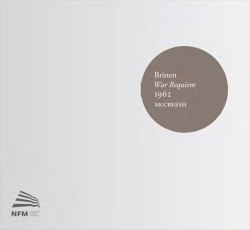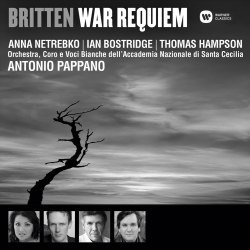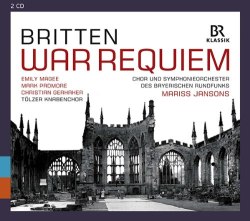| 
Support
us financially by purchasing this disc from |
|
|
|
|
|

Support
us financially by purchasing this disc from |
|
|
|
|

|
Support
us financially by purchasing this disc from |
|
|
|
|
|
|
Benjamin BRITTEN (1913-1976)
War Requiem, Op. 66 (1962) [84:05]
Susan Gritton (soprano), John Mark Ainsley (tenor), Christopher Maltman (baritone),
Wrocław Philharmonic Choir, Gabrieli Young Singers Scheme, Chetham’s Chamber Choir, North West Youth Chorale, Taplow Youth Choir, Ulster Youth Chamber Choir, Trebles of the Choir of New College Oxford
Gabrieli Consort and Players/Paul McCreesh
rec. 26 February 2012, Birmingham Town Hall, England, 5/9 January 2013, Watford Colosseum, England, 15 March 2013, Church of St. Michael and All Angels, Summertown, Oxford, England
Full Latin and English texts with English translation included.
SIGNUM RECORDS SIGCD340 [37:20 + 46:45]
War Requiem [80:05]
Anna Netrebko (soprano), Ian Bostridge (tenor), Thomas Hampson (baritone)
Orchestra, Coro e Voci Bianche dell'Accademia Nazionale di Santa Cecilia, Roma/Sir Antonio Pappano
rec. 25-26, 28-29 June 2013, Sala Santa Cecilia, Auditorium Parco della Musica, Rome, Italy
Full Latin and English texts with English translation included.
WARNER CLASSICS 6154482 [80:05]
War Requiem [87:22]
Emily Magee (soprano), Mark Padmore (tenor), Christian Gerhaher (baritone),
Tölzer Knabenchor, Chor und Symphonieorchester des Bayerischen Rundfunks/Mariss Jansons
rec. live 13-15 March 2013, Philharmonie im Gasteig, München, Germany
Full Latin and English texts. No English translation of the Latin is included.
BR KLASSIK 900120 [48:20 + 39:02]
As this year 2013 marks the centenary of Benjamin Britten’s
birth performances of his War Requiem are being given in satisfying
numbers. One can see how the commission would have greatly appealed
to Britten as, right from his early schooldays, he found all violence
abhorrent. With the outbreak of war looming Britten left England for
North America between the years 1939 and 1942. As an active pacifist
during World War Two, upon his return to England, he refused to be
conscripted into the British Armed Forces and as a conscientious objector
had to appear before a tribunal in 1942. Coventry Cathedral was destroyed
by German bombing in 1940 and in 1958 during construction work on
a new Cathedral he was commissioned to write a work for the consecration
ceremony which must have been powerfully motivating. In response Britten
wrote the War Requiem,considered by many to be a masterwork
of the genre, a massive six movement score for soprano, tenor and
baritone soloists, chorus and a boy’s choir with a full orchestra,
a chamber orchestra and organ with the forces divided into three distinct
groups. This statement of Britten’s fervent pacifist convictions,
possibly combined with an element of his survivor’s guilt for
not being part of the war effort, comprises a setting of the traditional
Latin text of the Missa pro Defunctis combined with verse from
nine anti-war poems by the English First World War poet Wilfred Owen.
The soprano soloist, choir and the boys’ choir are allocated
the Latin text with the tenor and baritone singing the Wilfred Owen
verse that serves as commentary. Michael Tippett, a friend of Britten
and fellow pacifist who served a prison sentence at Wormwood Scrubs
as a conscientious objector, described the War Requiem as “the
one musical masterwork we possess with overt pacifist meanings.”
The première of the War Requiem was given at Coventry
Cathedral in May 1962. To further emphasise the spirit of reconciliation
Britten had originally intended his soloists to be from Russia, Britain
and Germany: namely Galina Vishnevskaya, Peter Pears and Dietrich
Fischer-Dieskau. Unfortunately the Soviet authorities prevented Vishnevskaya
singing at the first performance opening the way for Belfast-born
Heather Harper to stand in at short notice.
As their tribute to the Britten centenary, conductors Paul McCreesh,
Sir Antonio Pappano and Mariss Jansons have each directed new recorded
performances of the War Requiem.
For the release on Signum Records the conductor is Paul McCreesh,
founder and artistic director of the London based Gabrieli Consort
and Players. For his three soloists McCreesh has engaged an experienced
all-English team of Susan Gritton (soprano), John Mark Ainsley (tenor)
and Christopher Maltman (baritone). In addition to the singers of
the Gabrieli Consort for his choral forces McCreesh has brought together
the Wrocław Philharmonic Choir and the Gabrieli Young Singers
Scheme: Chetham’s Chamber Choir, the North West Youth Chorale,
the Taplow Youth Choir and the Ulster Youth Chamber Choir. Also utilised
on the recording are the trebles of the Choir of New College Oxford.
With one hundred and eighty four singers in total this large choir
groups a mix of professional and amateur performers and maintains
the Anglo/Polish artistic collaboration that McCreesh has established
in recent years. Employing a total of one hundred and three players
McCreesh has substantially augmented the number of his Gabrieli Players
and in addition there is a separate chamber orchestra that includes
the Carducci Quartet. I note that the recording was made in 2013 under
studio conditions, without any live element, across the three locations
Watford Colosseum, Birmingham Town Hall and the Church of St. Michael
and All Angels, Summertown, Oxford. McCreesh’s large choral
forces sing with enthusiasm and commitment, and given that they are
made up of several groups their unity is especially notable. The large
orchestra and chamber orchestra give sympathetic performances with
the brass of the main orchestra sounding especially impressive. I
loved the sound of the twelve trebles of the New College Oxford: fresh,
alert and committed. McCreesh’s trio of soloists is well matched
too. The tenor John Mark Ainsley displays impressive tonal shading
and clear diction. The warm, medium-dark tone of baritone Christopher
Maltman is expressive and sincere. Soprano Susan Gritton also inspires
with her bright clarity and forthright delivery. With his satisfying
choice of tempi McCreesh manages to keep everything together in an
efficient manner maintaining convincing forward momentum. All-round
this is a splendid performance of clarity, polish and precision but
without the raw power and emotional intensity generated by the Pappano
and Jansons accounts. The Signum engineers provide cool and vividly
clear sound, well balanced too. Congratulations are also in order
for the highly comprehensive booklet notes and fascinating array of
photographs complete with sung texts and English translation of the
Latin.
For his Warner Classics recording Sir Antonio Pappano has turned to
the Orchestra, Coro e Voci Bianche dell'Accademia Nazionale di Santa
Cecilia from Rome with whom Pappano has been musical director since
2005. Pappano’s chosen soloists - a stellar trio - are headed
by opera stars Russian soprano Anna Netrebko, American baritone Thomas
Hampson also well-known English tenor Ian Bostridge. Under studio
conditions the recording was made in 2013 at the Sala Santa Cecilia,
Auditorium Parco della Musica in Rome. A couple of months after making
the recording Pappano and his Roman orchestra and chorus performed
the score to great acclaim at this summer’s Salzburg Festival.
Pappano is highly assured with his large forces adopting speeds that
feel broad and with a timing that means the work can be accommodated
on one disc. In a powerful performance, high on vitality, the amount
of drama that Pappano extracts is impressive with the brass and percussion
achieving a full imposing sound. The exuberant choral forces are full
of character and sincerity and maintain praiseworthy unity. Unlike
McCreesh and Jansons who use boy trebles, Pappano’s wonderfully
fresh-sounding children’s group is made up of girls as well
as boys. I’m not sure how often these Roman forces have performed
this score but they appear extremely comfortable with the Latin text,
as one might expect, and with the onerous demands of the writing.
Pappano’s trio of soloists performs with rather mixed results.
The voice of tenor Ian Bostridge can be an acquired taste. In this
work, that he knows intimately having sung it over sixty times, he
reminds me of Peter Pears. Bostridge’s bright tone is exceptionally
clear and he performs with unerring expression. Classy operatic bass
Thomas Hampson is in complete control, rock-steady, vital with a clear
timbre. By contrast in this repertoire Netrebko seems somewhat out
of sorts with the Latin texts. It seems she was ill for the main recording
with her voice patched in later. She feels a touch unsteady, grabbing
at the high notes, sounding shrill at times. Overall this is a fiercely
powerful account, persuasively performed although it doesn’t
have the polish of McCreesh and nor quite the moving penetration of
Jansons. Excellent well balanced sound quality with a wide dynamic
range has been provided. For this review I have the pre-release copy
of the CD but I am assured that full texts with English translations
of the Latin will be included in the finished item.
On the BR Klassik label the Mariss Jansons account with the Chor und
Symphonieorchester des Bayerischen Rundfunks was recorded live across
three concerts given at the Munich Philharmonie in March 2013. I was
fortunate to have reported from the second of these three concerts
and I found the performance quite stunning leaving a considerable
impression. Jansons’ excellent trio of soloists with the famous
Tölzer Knabenchor all provide admirable contributions. Maestro
Jansons positioned his soloists close to his podium, the chamber orchestra
to his left/front of the stage and one could hear but not see the
boys’ choir. In this live recording I was struck by how adept
Jansons and his well prepared forces were with Britten’s tough
harmonies and rhythms drawing a sharply positive response. Jansons’
chosen speeds feel judicious, providing a moving performance of splendid
expressive contrasts that combine to real dramatic effect. Superbly
coached by chorus master Michael Gläser the Chor des Bayerischen
Rundfunks is on tip-top form evincing a real feeling for the Latin
texts and the Tölzer Knabenchor sound fresh and expressive. Jansons
is a master with large forces and directs throughout with assured
control. I remain delighted by the contributions of the three excellent
soloists who display well contrasted voices. London-born tenor Mark
Padmore knows this work well and is highly effective with especially
clear diction and he varies his tone splendidly with steadfast control.
Christian Gerhaher is one of the finest baritones around today and
his performance is movingly expressive, displaying splendid tonal
shading. The playing of the chamber group of musicians in their steadfast
accompaniment to the pair of male soloists is thoroughly adept. American
Emily Magee is a bright-toned soprano with a noticeable if not too
obtrusive vibrato. A touch unsteady initially, her projection improves
steadily as the work progresses and her sincerity for the text is
unmistakeable. The sound quality of this live account from the Philharmonie
is first class serving Jansons’ performance well. Full texts
are included but no English translation of the Latin.
Of these three excellent recordings of the Britten War Requiem
I found the Mariss Jansons live Munich account the most compelling.
Without a weak link in his chosen groups of musicians he establishes
unwavering close control over his forces and generates considerable
emotional intensity. Responding powerfully and with conviction the
singers penetrate deep to the heart of the texts which emphasise the
futility of war.
Michael Cookson
Previous reviews
Jansons: John
Quinn
McCreesh: John
Quinn ~~ Paul
Corfield Godfrey ~~ Simon
Thompson
Pappano: John
Quinn
Masterwork
Index
 |
 |
|



 All Nimbus reviews
All Nimbus reviews








